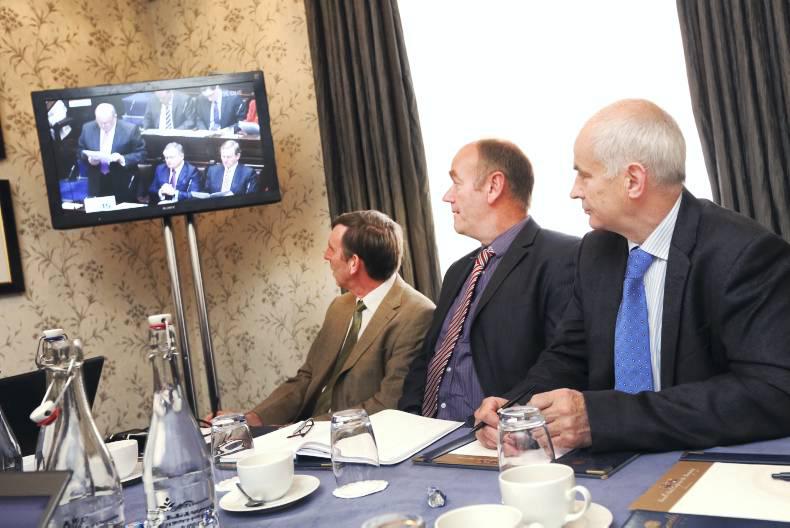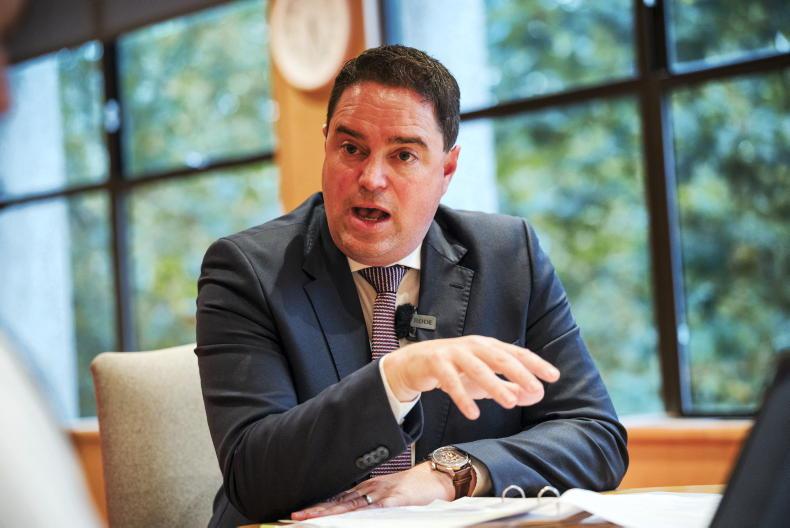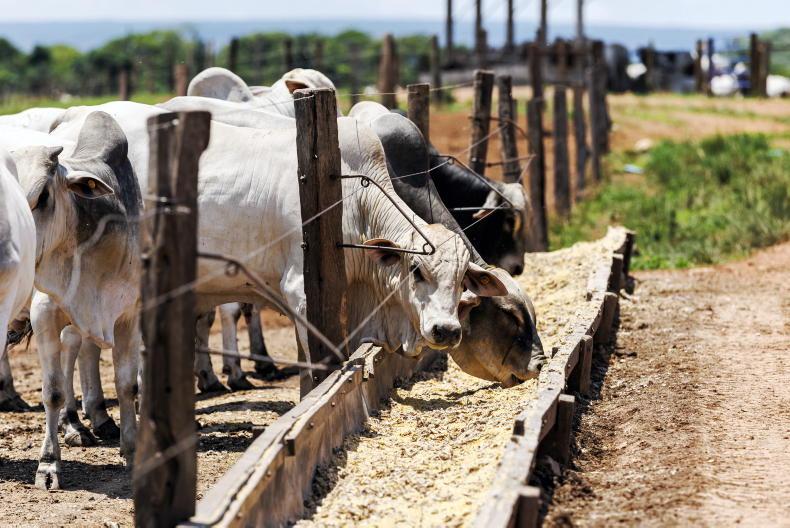Up to €580m needs to be fully implemented as part of the Rural Development Programme in 2016, according to the IFA’s budget submission. The association is also calling for tax-free family farm partnerships and the retention of 90% agricultural relief for farm transfers.
The IFA clearly sees Budget 2016 as a critical test of the Government’s commitment to agriculture and in particular implementing the much-talked-about Rural Development Programme.
“Previous cuts have seen the expenditure on farm schemes fall below €450m for the last two years. The recovery in the public finances and the measurable contribution of agriculture and the agri-food sector to economic recovery provides a strong justification for the reversal of cuts to farm schemes and full implementation of new schemes,” the IFA says.
The long shopping list also highlights solutions for smaller taxation irritants, such as the unnecessary high tax of quad bikes.
What the IFA wants
The €580m, if delivered, will mean the most to farmers by boosting their incomes in 2016.
€250m to be allocated for agri-environment schemes to ensure full payments for all AEOS participants and the 50,000 farmers that will enter and get paid on GLAS in 2016. An additional €5m would be allocated to the National Parks and Wildlife Service (NPWS) to pay farmers where restrictions to farming result from land designation that are not covered by the GLAS scheme.€65m for the suckler cow herd provided through the Beef Data and Genomics Scheme in Budget 2016. The IFA also called for an increase of payments to €200/cow over the coming budgets;€15m for the rollout of Knowledge Transfer programmes.€40m for TAMS II in 2016, to cater for all sectors.€205m for the Area of National Constraint scheme.€25m for a new targeted payment for the ewe flock. It also wants an increased funding allocation in 2017 to reach €20/ewe.€5m for horticulture. This funding increase, the IFA says, is critical support for a sector that is creating employment. In addition, the IFA wants compensation for nurseries for income losses and disposal costs arising from the closure of markets due to ash-dieback disease.€5m for bioenergy and biomass projects.Animal health
Increased funding allocation for the TB eradication programme to include increased payments for affected farmers.
The IFA is also looking for a properly funded deer management programme to alleviate the difficulties caused by the expanding population, including targeted resources where deer are associated with TB breakout.
Forestry
Funding for a 7,000ha planting programme.Funding for existing forest owner groups to realise the economic potential of the private forest resource.Funding of the existing Forest Road Scheme must be maintained.Tax-free family
partnerships
One of the biggest pushes is for the farm transfer partnership to encourage the lifetime transfers of family farms. It is aimed at encouraging transfers in situations where the farm income is not big enough for two families. This IFA concept was included in the agri-taxation review but was not implemented last year.
The new type of partnership would see a profit share partnership of up to 10 years, after which the farm would be transferred. During that time, the landowner’s share of the profit would receive tax relief up to an agreed ceiling, effectively growing the net income shared. At the end of the relief, a minimum of 80% of the asset would be transferred or the tax relief would be clawed back.
Extending land lease
The IFA also sees the need for the land leasing tax exemption to be extended to leases between siblings with some restrictions. The IFA is looking for a significant increase in asset transfer thresholds to reflect the rise in asset values and also the retention of the 90% agricultural and business relief.
The association also wants the 33% rates for CGT and CAT to be reduced to encourage investment.
The IFA wants stamp duty relief for young trained farmers extended past the current proposed expiry date of December 2015. It sees it as an important tool to ensure timely succession, land transfer and productive use of agricultural assets.
It also wants 100% stock relief for young trained farmers, as well as the 25% general stock relief and the additional 50% stock relief extended to all registered farm partnerships retained.
Levelling the PAYE field
The IFA is calling for equal treatment between self-employed and PAYE workers. Currently, employees enter the income tax net at twice the income level of self-employed, including farmers (€16,500 v €8,250). Due to the PAYE tax credit of €1,650 at the current national minimum wage rate of €8.65/hour (approximately €17,500 per year), a self-employed worker pays five times the level of taxes and charges of an employee. (See page 63.)
Accelerated capital
allowances
An extension of the accelerated capital allowances scheme for investment in energy efficient equipment to sole traders. This was proposed in the Agri-taxation Review, and would be a progressive move to encourage on-farm investments and improve the overall efficiency of farming enterprises. The IFA believes that greater flexibility should be introduced into the capital allowances system for farm buildings, with an optional system of increased capital allowances of up to 50% over the first two years to reduce the impact on cashflows. The balance of 50% would be spread over the remaining five-year writing-down period at the rate of 10%, which could be supplemented by “unused” percentages from the first two years.
Tackling volatility
Around income volatility, the IFA welcomes the introduction of five-year income averaging brought in last year but wants to go further by providing greater flexibility on the timing of income deductions and the reintroduction of funding into farm enterprises. This was similar to a French income volatility measure mentioned in the Agri-taxation Review. The IFA also believes that income averaging of farm profits should be allowed where a spouse of a farmer has a fully separable source of income from self-employment.
Co-op shares
The compulsory purchase of co-op shares or other forms of compulsory financial contribution fulfilling the same role should be treated by the tax code as a qualifying capital expenditure. The IFA proposes this would only apply to new purchases of mandatory share purchases/licences/financial contributions and be a huge benefit to new entrants.
Quad tax
To remove the difficulties surrounding the taxation of farm quads, the IFA proposes that a system similar to that which operates in the UK is introduced. Quads should be registered as a light agricultural vehicle, with a nil value tax disc, where by the quad can be used when a very small distance is travelled between sites.
The Government will announce Budget 2016 on 15 October 2015.
Up to €580m needs to be fully implemented as part of the Rural Development Programme in 2016, according to the IFA’s budget submission. The association is also calling for tax-free family farm partnerships and the retention of 90% agricultural relief for farm transfers.
The IFA clearly sees Budget 2016 as a critical test of the Government’s commitment to agriculture and in particular implementing the much-talked-about Rural Development Programme.
“Previous cuts have seen the expenditure on farm schemes fall below €450m for the last two years. The recovery in the public finances and the measurable contribution of agriculture and the agri-food sector to economic recovery provides a strong justification for the reversal of cuts to farm schemes and full implementation of new schemes,” the IFA says.
The long shopping list also highlights solutions for smaller taxation irritants, such as the unnecessary high tax of quad bikes.
What the IFA wants
The €580m, if delivered, will mean the most to farmers by boosting their incomes in 2016.
€250m to be allocated for agri-environment schemes to ensure full payments for all AEOS participants and the 50,000 farmers that will enter and get paid on GLAS in 2016. An additional €5m would be allocated to the National Parks and Wildlife Service (NPWS) to pay farmers where restrictions to farming result from land designation that are not covered by the GLAS scheme.€65m for the suckler cow herd provided through the Beef Data and Genomics Scheme in Budget 2016. The IFA also called for an increase of payments to €200/cow over the coming budgets;€15m for the rollout of Knowledge Transfer programmes.€40m for TAMS II in 2016, to cater for all sectors.€205m for the Area of National Constraint scheme.€25m for a new targeted payment for the ewe flock. It also wants an increased funding allocation in 2017 to reach €20/ewe.€5m for horticulture. This funding increase, the IFA says, is critical support for a sector that is creating employment. In addition, the IFA wants compensation for nurseries for income losses and disposal costs arising from the closure of markets due to ash-dieback disease.€5m for bioenergy and biomass projects.Animal health
Increased funding allocation for the TB eradication programme to include increased payments for affected farmers.
The IFA is also looking for a properly funded deer management programme to alleviate the difficulties caused by the expanding population, including targeted resources where deer are associated with TB breakout.
Forestry
Funding for a 7,000ha planting programme.Funding for existing forest owner groups to realise the economic potential of the private forest resource.Funding of the existing Forest Road Scheme must be maintained.Tax-free family
partnerships
One of the biggest pushes is for the farm transfer partnership to encourage the lifetime transfers of family farms. It is aimed at encouraging transfers in situations where the farm income is not big enough for two families. This IFA concept was included in the agri-taxation review but was not implemented last year.
The new type of partnership would see a profit share partnership of up to 10 years, after which the farm would be transferred. During that time, the landowner’s share of the profit would receive tax relief up to an agreed ceiling, effectively growing the net income shared. At the end of the relief, a minimum of 80% of the asset would be transferred or the tax relief would be clawed back.
Extending land lease
The IFA also sees the need for the land leasing tax exemption to be extended to leases between siblings with some restrictions. The IFA is looking for a significant increase in asset transfer thresholds to reflect the rise in asset values and also the retention of the 90% agricultural and business relief.
The association also wants the 33% rates for CGT and CAT to be reduced to encourage investment.
The IFA wants stamp duty relief for young trained farmers extended past the current proposed expiry date of December 2015. It sees it as an important tool to ensure timely succession, land transfer and productive use of agricultural assets.
It also wants 100% stock relief for young trained farmers, as well as the 25% general stock relief and the additional 50% stock relief extended to all registered farm partnerships retained.
Levelling the PAYE field
The IFA is calling for equal treatment between self-employed and PAYE workers. Currently, employees enter the income tax net at twice the income level of self-employed, including farmers (€16,500 v €8,250). Due to the PAYE tax credit of €1,650 at the current national minimum wage rate of €8.65/hour (approximately €17,500 per year), a self-employed worker pays five times the level of taxes and charges of an employee. (See page 63.)
Accelerated capital
allowances
An extension of the accelerated capital allowances scheme for investment in energy efficient equipment to sole traders. This was proposed in the Agri-taxation Review, and would be a progressive move to encourage on-farm investments and improve the overall efficiency of farming enterprises. The IFA believes that greater flexibility should be introduced into the capital allowances system for farm buildings, with an optional system of increased capital allowances of up to 50% over the first two years to reduce the impact on cashflows. The balance of 50% would be spread over the remaining five-year writing-down period at the rate of 10%, which could be supplemented by “unused” percentages from the first two years.
Tackling volatility
Around income volatility, the IFA welcomes the introduction of five-year income averaging brought in last year but wants to go further by providing greater flexibility on the timing of income deductions and the reintroduction of funding into farm enterprises. This was similar to a French income volatility measure mentioned in the Agri-taxation Review. The IFA also believes that income averaging of farm profits should be allowed where a spouse of a farmer has a fully separable source of income from self-employment.
Co-op shares
The compulsory purchase of co-op shares or other forms of compulsory financial contribution fulfilling the same role should be treated by the tax code as a qualifying capital expenditure. The IFA proposes this would only apply to new purchases of mandatory share purchases/licences/financial contributions and be a huge benefit to new entrants.
Quad tax
To remove the difficulties surrounding the taxation of farm quads, the IFA proposes that a system similar to that which operates in the UK is introduced. Quads should be registered as a light agricultural vehicle, with a nil value tax disc, where by the quad can be used when a very small distance is travelled between sites.
The Government will announce Budget 2016 on 15 October 2015.








SHARING OPTIONS